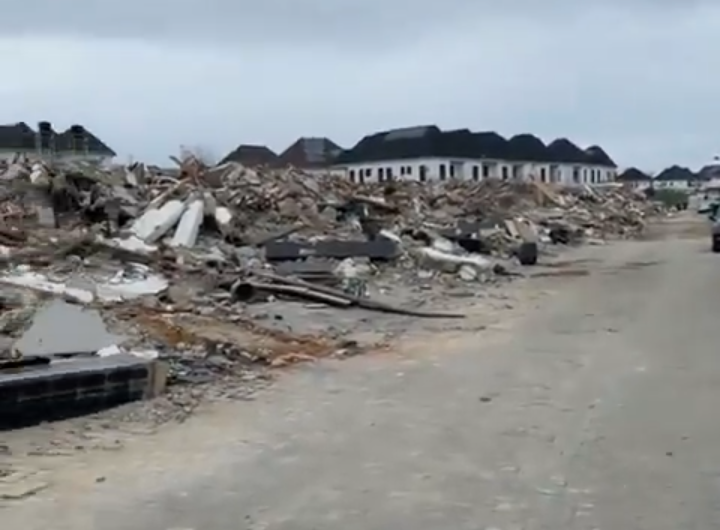
“I Never Demanded ₦700 Million to Stop Demolitions” — Lagos Commissioner Tokunbo Wahab Breaks Silence Amid Viral Allegations

In a swift response to growing public outrage, Lagos State Commissioner for the Environment and Water Resources, Tokunbo Wahab, has firmly denied claims that his ministry demanded a staggering ₦700 million from property owners to halt the planned demolition of houses in Oral Estate, Ikota. The allegations, which spread rapidly across social media platforms and sparked heated conversations among Lagos residents, had accused senior officials of the ministry of corruption and extortion in exchange for sparing properties allegedly built on drainage channels.
Speaking on Sunday through an official statement, Wahab dismissed the reports as entirely false, describing them as “a mischievous attempt to discredit the government’s urban renewal and environmental enforcement efforts.” He clarified that the ongoing demolition in the area is a legal and necessary exercise aimed at restoring proper drainage channels and preventing recurrent flooding, not an avenue for extortion or personal enrichment.
According to the commissioner, the properties affected in Oral Estate and surrounding Ikota axis encroach upon major drainage setbacks that are critical to flood management in Eti-Osa and Lekki environs. He explained that the Ministry had, for months, issued warnings, served contravention notices, and held community meetings with developers and property owners before the enforcement team moved in. Wahab emphasized that the Lagos State Government operates with transparency and due process, and no official under his supervision has the authority to demand or receive any money in exchange for stopping a demolition.
“Let me state categorically that neither I nor anyone in my ministry demanded any form of payment from property owners in Oral Estate or anywhere else. The ongoing enforcement activities are strictly in line with the Lagos Drainage Master Plan and the Governor’s directive to ensure that Lagos remains flood-free,” Wahab said. “We will not be distracted by false narratives or blackmail from individuals who have violated environmental laws and now seek public sympathy through fake news.”
The commissioner’s rebuttal came after several residents of Oral Estate took to social media, claiming that officials had approached them with offers to “settle” the ministry with ₦700 million collectively to avoid the demolition of their homes. The posts, which gained traction on X (formerly Twitter) and Facebook, alleged that some affected homeowners were pressured into making contributions. The story quickly went viral, prompting public backlash and calls for investigation into what many described as “another example of corruption in the system.”
However, a closer look reveals that this is not the first time the Lagos State Government has been accused of heavy-handedness in its demolition exercises. In recent months, demolitions have been carried out in several highbrow areas, including Lekki, Jakande, and Mende, drawing both criticism and support from different sections of the public. While many Lagosians commend the government’s resolve to reclaim drainage channels and prevent catastrophic flooding, others argue that some demolitions appear selective or politically motivated.
Reacting to these concerns, Wahab reiterated that the government’s primary motivation is safety and environmental preservation, not politics. He noted that the state spends billions annually on flood control infrastructure, and those efforts are wasted if illegal constructions continue to block water flow. “People build on canals and expect miracles when it rains,” he said. “Our responsibility as a government is to protect lives and properties. The era of impunity is over. Lagos cannot afford to keep losing lives and investments to preventable flooding.”
Wahab also urged residents to verify information before spreading unconfirmed stories online, cautioning that misinformation undermines public trust and fuels unnecessary panic. “We understand the emotions involved when people lose properties, but it is wrong to resort to falsehoods to tarnish the image of public officials doing their jobs,” he said. “There are proper channels for lodging complaints or seeking clarifications, and we encourage affected residents to engage with us constructively.”
Meanwhile, several groups have reacted to the commissioner’s statement. The Lagos State Residents Association issued a brief note supporting the ministry’s position, saying that while demolitions are painful, they are necessary for the greater good. “Floods do not discriminate,” the statement read. “When the canals are blocked, the entire community suffers. It is better to enforce planning laws now than to watch another disaster unfold during the rainy season.”
On the other hand, some residents of Oral Estate insist that the government should show more compassion and flexibility in enforcement. They argue that many property owners bought their homes through registered real estate firms, with proper approvals at the time of purchase. “We are not criminals,” one resident lamented. “We bought these houses in good faith. If the government has new plans, they should compensate us or provide relocation options instead of destroying our homes overnight.”
Legal experts have also weighed in on the controversy, calling for transparency and accountability in how enforcement decisions are made. Barrister Tunde Ogundele, an environmental lawyer based in Lagos, noted that while the government has the right to reclaim public drainage setbacks, affected homeowners should have access to fair hearing and possible redress if they can prove compliance with existing laws. “The challenge in Lagos is not just illegal building but inconsistent approval systems. Some properties were approved years ago by one administration and later declared illegal by another,” he explained. “Until there is uniformity and proper land administration reform, these conflicts will keep reoccurring.”
As the dust settles around the Oral Estate controversy, the Lagos State Government faces the dual challenge of enforcing environmental regulations while maintaining public confidence. Wahab’s firm denial may help calm the situation temporarily, but public trust hinges on visible transparency, fair enforcement, and open communication. Many Lagosians are watching closely to see if the government will back up its words with concrete actions — such as publishing verified demolition lists, clarifying approval histories, and holding errant developers accountable.
For now, Tokunbo Wahab maintains that the Ministry’s hands are clean and that the ₦700 million bribery allegation is a fabrication designed to derail genuine environmental reforms. “This administration stands for integrity, order, and the rule of law,” he said. “No amount of blackmail will stop us from reclaiming our drainage channels and protecting Lagos from avoidable disasters.”
As Lagos continues to grapple with the pressures of rapid urbanization, population growth, and environmental degradation, the Oral Estate saga serves as a reminder of the fragile balance between progress and accountability. Whether the public believes the commissioner’s defense or not, one thing is clear — the battle to keep Lagos flood-free is far from over, and the tension between property rights and environmental responsibility will remain one of the state’s most pressing challenges.


